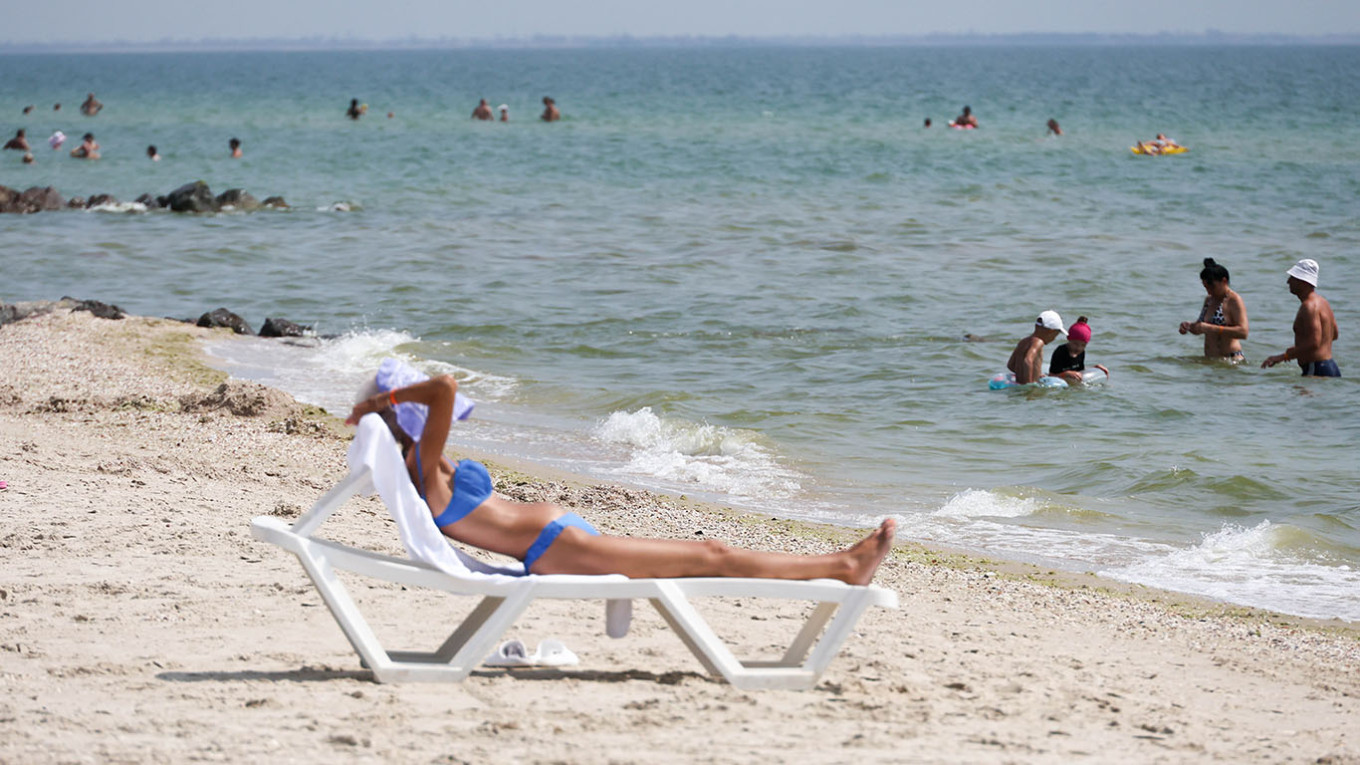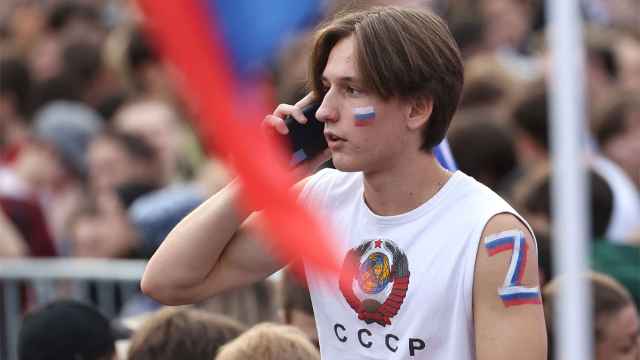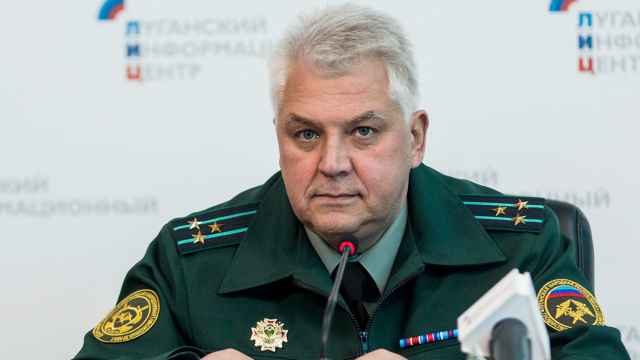Before Russia’s full-scale invasion, locals in the small resort town of Kyrylivka in Ukraine’s Zaporizhzhia region launched an online project about vacationing on the Sea of Azov. They would share stories about jellyfish, extreme sports and holiday camps and live-stream videos from the coastline.
After Russian troops entered the town in March 2022, the Kyrylivka.Ukr YouTube channel switched from jellyfish stories to videos of fires, explosions and shelling in nearby Berdiansk. By fall 2022, it had stopped uploading altogether.
Today, pro-Russian bloggers are the ones producing content from the occupied Ukrainian resorts.
Over three years into Moscow’s occupation of southern Ukraine, Russia is promoting seaside getaways to towns like Kyrylivka and Berdiansk as part of a broader push to normalize control over territory it seized by force.
Occupying authorities are expecting 150,000 tourists in the Zaporizhzhia region and another 100,000 in the Kherson region this year and say they are working to restore Soviet-style health resorts, including facilities for recovering soldiers.
Russian state media publish glowing guides to seaside escapes in what they refer to as the “new regions.” Mariupol, the port city that was nearly flattened in the 2022 Russian siege, has been described by propagandists as “the most popular resort” on Ukrainian soil.
This spring, the vice president of Russia’s Travel Agencies Alliance touted the beaches of the newly occupied Ukrainian regions as “cleaner” and “less crowded” than traditional destinations like Crimea or Russia’s Black Sea coast.
“The resort season will be organized, with good service and without unnecessary worries,” Vladimir Saldo, the Russian-installed governor of the Kherson region, said earlier this year.
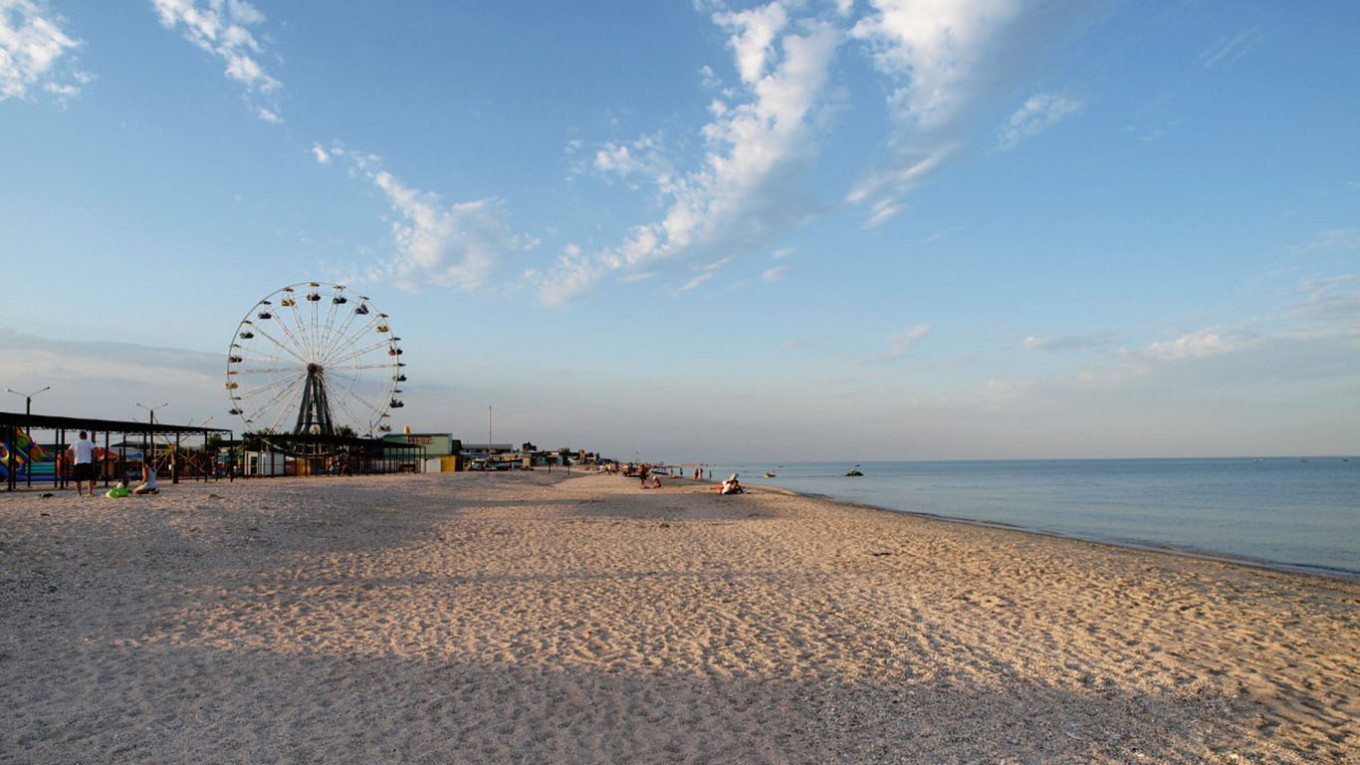
In Telegram chats like Vacations on the Sea of Azov, offers to meet sex workers, exchange hryvnias for rubles (and vice versa) or even buy drugs can be seen alongside listings for vacation rentals.
Russian tourists, often from regions bordering Ukraine, can expect to pay around 2,000 rubles ($22) per night in occupied Kyrylivka.
At the Avalon guesthouse, once popular with Ukrainian vacationers, prices are slightly higher at 2,200 rubles ($28) per night. In the pre-war year of 2021, prices for a double room at Avalon ranged from 250 to 750 hryvnias ($9 to $27) per person.
Irina, a staff member at a guesthouse in Kyrylivka, insists things are “calm for now.”
“There are quite a few people coming here now, more than last year. The beach near us is sandy, the water is shallow, so it’s comfortable for families with kids,” she told The Moscow Times, asking that her name be changed for safety reasons.
Rooms at Irina’s guesthouse start at 900 rubles (about $10) per night. Each room is equipped with a private bathroom, refrigerator, TV and air conditioning, and the guesthouse has a shared kitchen.
“If you’re not planning to cook, there’s a cafeteria nearby. I haven’t been there myself, but the guests who ate there said it was edible enough,” she said.
About an hour’s drive up the coast from Kyrylivka is the port city of Berdiansk, which occupying authorities are also promoting as a vacation getaway.
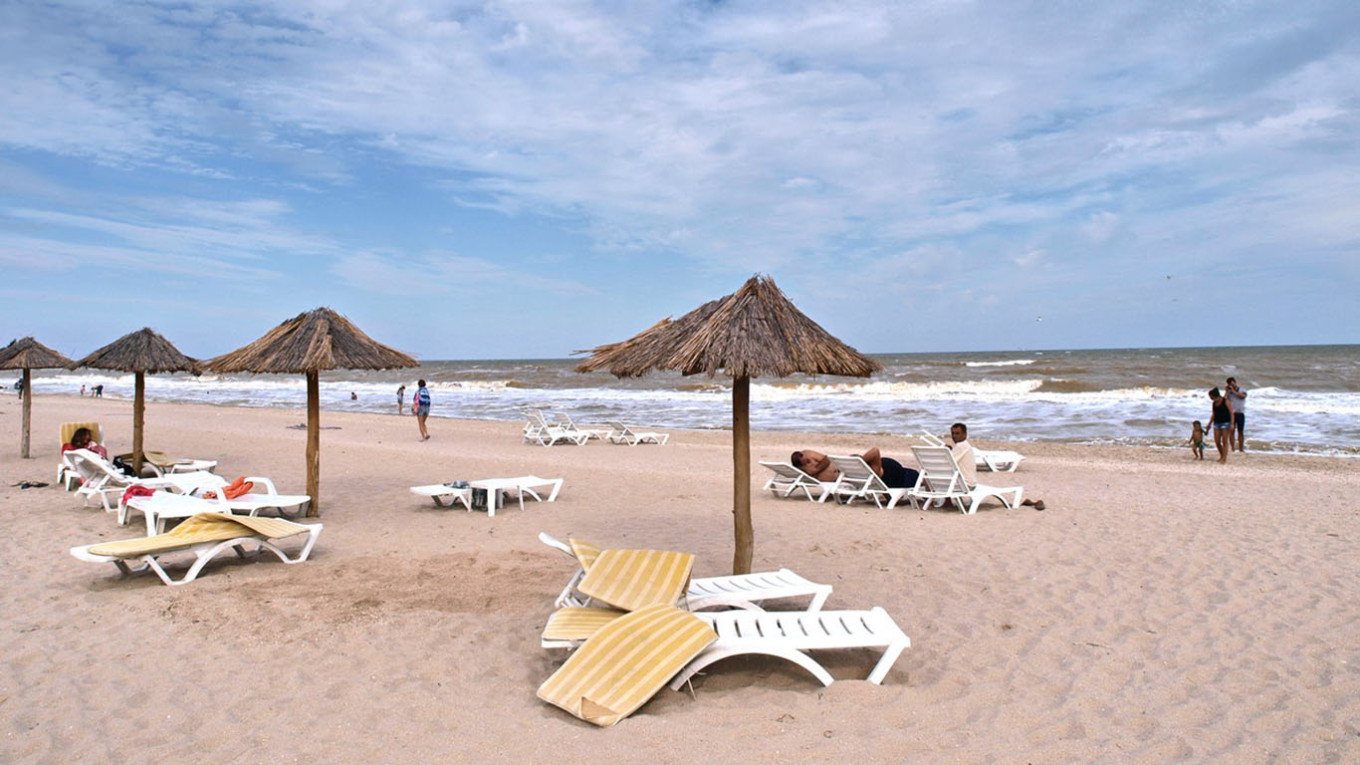
Tourists in Berdiansk can find accommodation as cheap as 700 rubles (around $8) per night for a bed in a triple room with a shared bathroom.
“But it’s a grandma-style place,” says the manager of a guesthouse with the same name, using a common Russian-language term for accommodations with outdated decor and appliances. “Very basic.”
There are pricier options too, like cottages with pools on the Berdiansk Spit.
“Everything there is fully booked right now,” the manager told The Moscow Times. “Lots of people, it’s chaos. But we have a nice barbecue area in the city center. It’s quiet, peaceful. Though we do have some jellyfish in the sea now.”
The southeastern Ukrainian coastal region’s transformation from a warzone into a beach destination stands in stark contrast to the destruction and repression that have accompanied Russia’s occupation.
Since Russia’s full-scale invasion, thousands of Ukrainians have been forced to flee their homes. Now, many face the risk of permanently losing property in areas occupied by Russia.
This spring in Mariupol, Russian authorities started seizing homes that belong to Ukrainians who fled from the war or were killed in the fighting. To reclaim their apartments, owners must appear in Mariupol in person and undergo a so-called “filtration” process.
“It’s a trap from every angle,” Ivan Stupak, an adviser to the Ukrainian parliament’s national security committee, told The Moscow Times of the requirements for Ukrainians to keep ownership of their homes.
“If it’s a man returning, there’s a high chance the local police will throw him in jail and start interrogating him about ties to Ukrainian intelligence,” Stupak explained. “When someone re-registers property documents under occupation, under Ukrainian law that’s considered collaboration with Russia.”
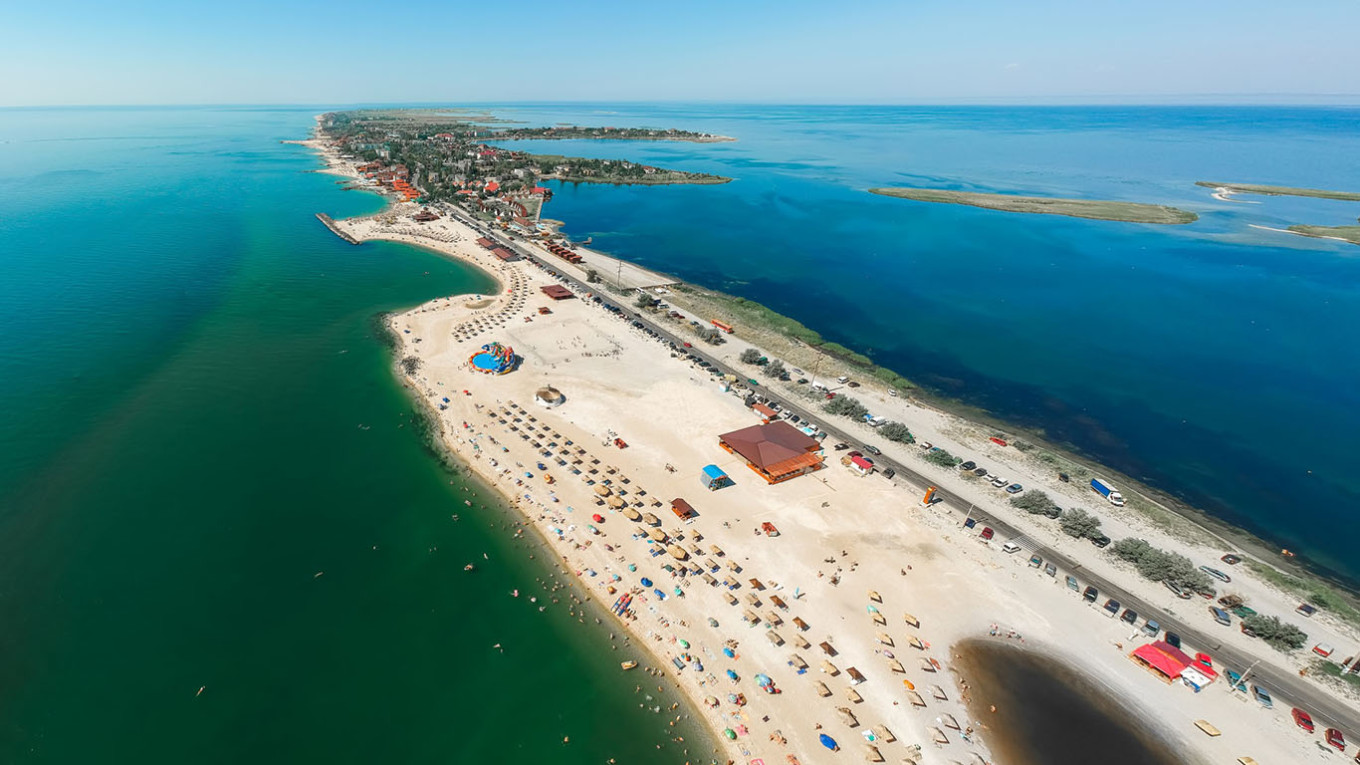
This spring, Russia’s lower-house State Duma passed a bill in its first reading allowing authorities to confiscate property from individuals who have left Russia — including the occupied territories — and spoken out “against the country’s interests.” The law would apply to both Russian citizens and foreigners.
Since last year, occupying authorities in Berdiansk have offered direct tours from the Russian cities of Taganrog, Rostov-on-Don and Novocherkassk.
The price for a three-day package currently starts at 12,000 rubles (about $130) and includes hotel stays, museum tours and meals.
Tour organizers mention the Zaporizhzhia region’s wartime curfew and 5 p.m. cutoff for alcohol sales, but make no reference to the ongoing war itself.
In other cases, Russian tourists pass through the occupied territories en route to Crimea. On RuTube, Russia’s domestic alternative to YouTube, vloggers post videos offering “useful tips” for passing through military checkpoints and reaching the occupied peninsula by car.
“The GPS stops working in Mariupol, but that’s not a problem,” says one blogger.
Stupak told The Moscow Times that it is currently impossible for Ukraine to retake the occupied territories.
“Right now, we simply don’t have the strength. The Ukrainian Armed Forces have a minimum objective: to stop Russia from advancing,” he explained.
“Before, a large part of Ukraine had easy access to the sea — within four to five hours. Now, seeing Russian tourists there makes it all the more painful for Ukrainians,” he said.
In one recent video report, a correspondent for the Russian tabloid Komsomolskaya Pravda stands on a beach near Berdiansk, smiling into the camera.
“What more needs to be said? Behind me is the Sea of Azov — crystal clear!” the correspondent says.
In the comments, one viewer replies: “You can’t build happiness on someone else’s misery.”
A Message from The Moscow Times:
Dear readers,
We are facing unprecedented challenges. Russia's Prosecutor General's Office has designated The Moscow Times as an "undesirable" organization, criminalizing our work and putting our staff at risk of prosecution. This follows our earlier unjust labeling as a "foreign agent."
These actions are direct attempts to silence independent journalism in Russia. The authorities claim our work "discredits the decisions of the Russian leadership." We see things differently: we strive to provide accurate, unbiased reporting on Russia.
We, the journalists of The Moscow Times, refuse to be silenced. But to continue our work, we need your help.
Your support, no matter how small, makes a world of difference. If you can, please support us monthly starting from just $2. It's quick to set up, and every contribution makes a significant impact.
By supporting The Moscow Times, you're defending open, independent journalism in the face of repression. Thank you for standing with us.
Remind me later.


